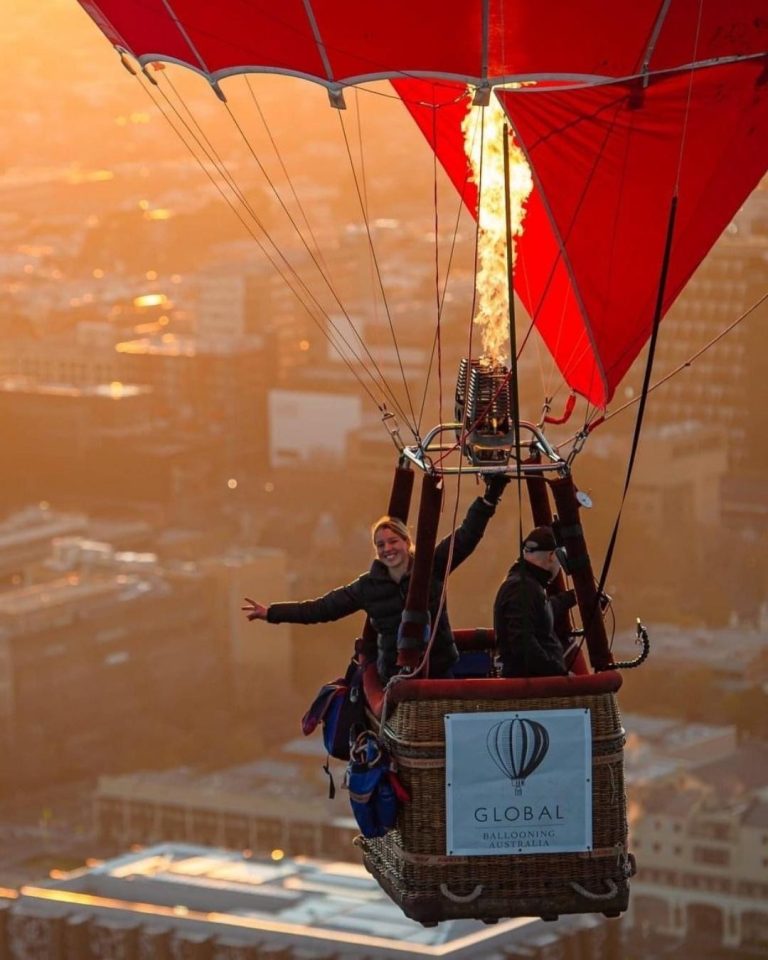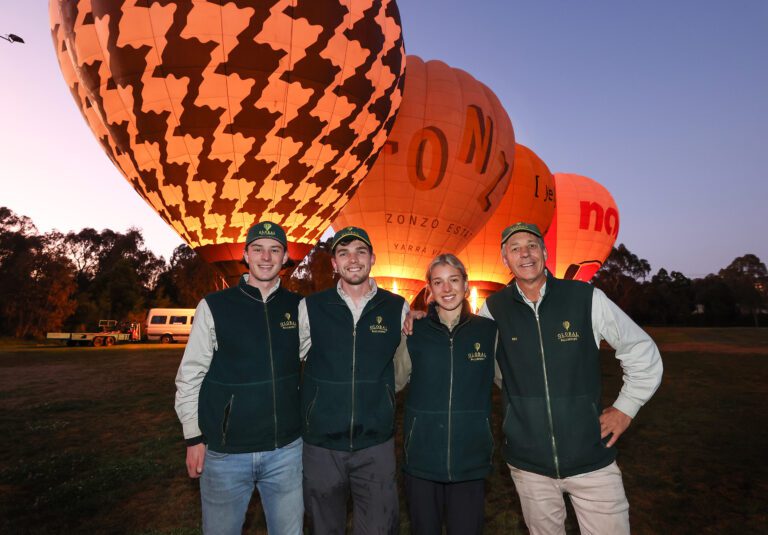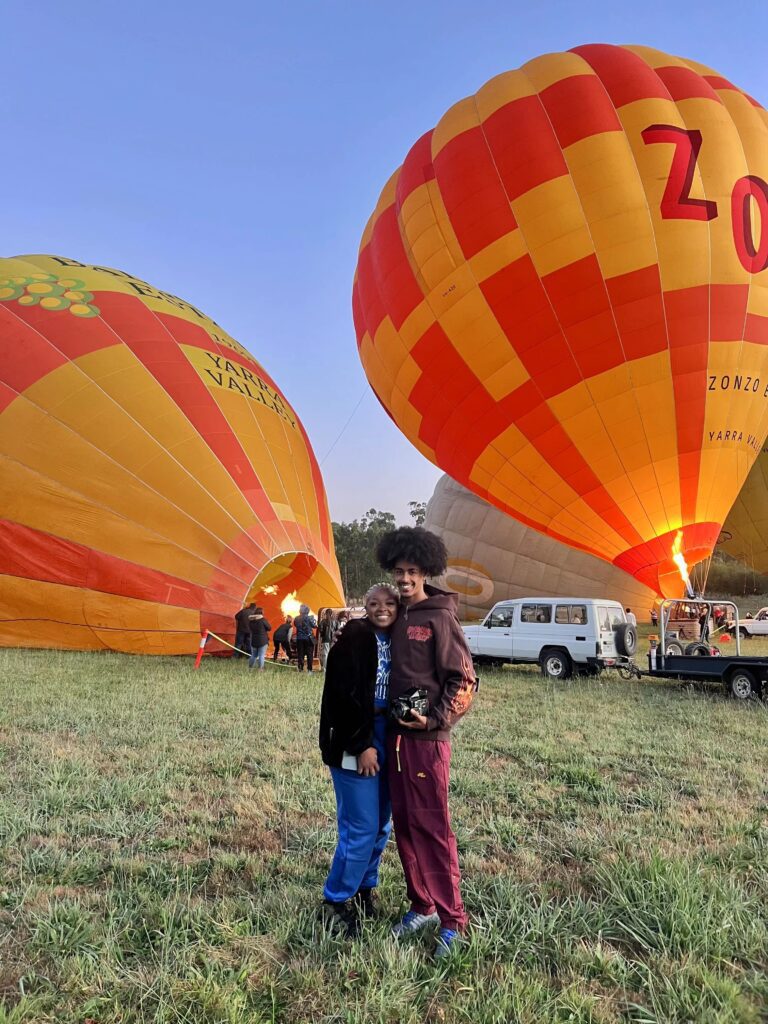Kiff has had an incredible journey and his own share of challenging events over the years. You can see from this interview the one thing that helps him overcome anything that comes his way is gratitude and a deep seeded love for what he does. For your convenience and reading pleasure we have transcribed the interview below. Alternatively, you can listen to Raf and Kiff HERE or read this article.
Rafael: This is really one of the most spectacular things I have ever done. I’m 2000 feet【610 m】 above the Northern suburbs of Melbourne. We are coming in over Studley Park and Yarra Bend. We’ve just been flying over Darebin creek in Northland. We are heading to the southeast. I think we’re going to end up near Moorabbin, and it is a glorious, beautiful, spectacular morning over Melbourne. A lot of the street lights are still on, and it’s remarkably calm and peaceful. This must be what it is like for a bird to soar over a city, and just cruise along. And we are quite literally sailing along in the wind. Kiff Saunders is the pilot, and our host today. Thanks for bringing us up here, Kiff.
Kiff: Yeah, Hi Raf.
Rafael: How did you get into ballooning?
I actually grew up around aviation, so I started flying when I was 15. But it all started before that. Because my grandfather set up a – one of Australia’s first flying schools, just out of Sydney in the mid 30’s. And so yeah, we kind of grew up around aviation. And so yeah, I kind of had that kind of will to get into the air from a child. And so yeah, I kind of started early. And then, it was just because the balloons started using the airport that my grandfather started, that I got to meet them. And at that stage I was in that kind of bohemian, trying to avoid any kind of responsibility. And the ballooning lifestyle really suited me. And I was offered this tour of Australia as the driver of a balloon troupe. And so yeah, we ended up travelling around Australia.
Rafael: What year was that?
Kiff: That was back in 1987, yeah. So, it was a fair while ago.
Rafael: So, this is your version of never getting a normal job?
Kiff: Yeah, absolutely. Avoiding responsibility, I like to call it.
Rafael: Except you’re responsible for everyone here in the basket. Do you ever get sick of this?
Kiff: Never. I just have to kind of – even on the hard days, and there are hard days of course. Like it’s just – kind of remind myself to be thankful that I do get to share this lifestyle.
Rafael: When people tell you what it feels like to be up here, what it looks like, how do you describe it?
Kiff: For me I stand in a basket, just kind of elevated above the land. So, I mean, for me, I’m in a platform where it’s almost like — Because it is lighter than air and you don’t get any sensation of speed – the world is kind of revolving underneath you, rather than actually you kind of speeding across. ‘Cause people have a perception it’s like riding a motorbike, being in an open cockpit. But I mean, we’re moving at 40 kilometres an hour now. And yet you would feel nothing.
Rafael: ‘Cause we are moving within that wind, so we don’t feel anything at all.
Kiff: So, there’s no turbulence, there’s nothing. And so, this lighter than air – it’s very poetic. It’s like a magic carpet ride really.
Rafael: Kiff, can you tell me a bit about accessibility? You had an accident that spurred you on to give a whole lot of people a chance to do this.
Kiff: Yeah about 5 years ago, I was hit by a car driving on the wrong side of the road. Which left me with a broken neck and a shattered leg, and it put me out of action for a year while I recovered. I didn’t build the accessible basket for – really any reason – then to thank, to do something. I just felt like I needed to thank all the people who put me back together. And my transport accident lawyers, they fell in love with ballooning as they kind of came out to see this whole thing. And they decided they would like to get into it. I said, “Look, I’ve been thinking of this concept of building a balloon that allows people who have mobility issues to come along. And they were really supportive of that. And so, we ended up going to the balloon manufacturer and asking them to design a basket that would allow people with accessibility issues to come along. There’s a tremendous network of people out there who do the most astonishing work for little credit. Prior to my accident, I was very much focused on business and that more capitalistic – just onward and upward type of lifestyle. And it was really humbling for me to realise that really, life is short. And I mean, it’s all very cliché what you can learn from these things.
Rafael: Doesn’t sound cliche, sounds like it was quite profound.
Kiff: Well, it was very profound for me, in the sense of just bringing me back to earth, for a bloke who’s just lived his life in the air. But just in my own – what you worry about, what you focus on. But certainly, the concept of giving. And what you give and how – your sense of leaving a legacy. And I guess nearly dying and realising that could have been it. That’s how people would remember me. I mean I just thought – look, I’d like to do something. And interestingly enough, I mean, we built the basket. We went to, we got the manufacturer to build it and type certify it. And we went to CASA and got them to rewrite the rules, so that we could take people like that. And that was it, we just thought – well, we’ve done that. Talk about return on investment. Because the people that we’ve flown, some of these people who are just severely disabled people, who would never have had that opportunity. I mean, to be taking them on a balloon flight over Melbourne. And to give them that opportunity. I mean just the thanks that they give you. I mean no money could ever reward you as much as what these people– And just the– I mean, when you surround yourself with people who really do struggle. They’re not – with their physical ability through life and do these things. I mean, you really learn a lot about yourself and just how lucky you are.
Rafael: We are coming over the Southeastern Freeway now. We can see the bay far more clearly.
Kiff: When the basket makes contact with the ground, it will want to stop. The 80 foot【24 m】 high sail keeps going. So, it tends to tilt the basket over. If there’s any speed to the wind, we’re going to go all the way over on our side. It’s called a layover landing. So, it’s very important on landing that you stow all of your gear, okay? Put everything away and hang on with your hands unencumbered. Put your cameras in your pockets. If you’ve got something around your neck, just zip it up and put it in your jacket, so it doesn’t swing around and hit the person next to you in the face. The main thing for me, for the last 2 minutes of the flight, is that you’re hanging on, and you’re in that human shock absorber position. Ready?
Rafael: Yeah.
Kiff: There we go. Going to tip over. There we go. You alright?
Rafael: Ah.
Kiff: Stay in, stay in the basket.
Rafael: We’re back in the truck now, sadly back on the ground. That was a little bit of a bumpy landing.
Kiff: Yeah well, we came in at 20 kilometres an hour, so yeah. With an 80 foot【24 m】 high sail above our head, you have to allow it to drag you along. But yeah, I mean, it’s apart of the adventure. As soon as it happens, you’ve got to bounce along, you tip over. Everyone laughs. I mean most people actually say it’s one of the better parts of the flight, is the layover landing.
Rafael: And you’ve got a – an experience of Black Saturday as well, I understand.
Kiff: I kind of must of had a black cat go past me or something about 7 years ago. I lived in Steele’s Creek, and on that day, we were completely taken by surprise by the Wandong fires, and the fire raced up the valley at breakneck speed. Tragically, with loss of life, and just destruction of many, many homes. Incredibly enough, our property survived the fire, although all of our neighbour’s houses were burnt. And that was quite a traumatic experience. Not so much – that’s a part of the Australian life, I think – fire. But yeah, just to see the hardship and sorrow associated with people losing everything. And then breaking down what was a very lovely community. People moving out, moving away. It had a kind of much bigger effect than the fire itself. But again, it was another learning experience in your life. I think that, again, these things – I tend to try to compartmentise in my head about. Like, again, reminding yourself what you’re thankful for. I mean in the sense of fire in Australia, I mean – yeah – listen to the people who know best about these, follow the instructions.
Rafael: Thanks for the ride in the balloon.
Kiff: Thanks Raf, thanks for coming.







